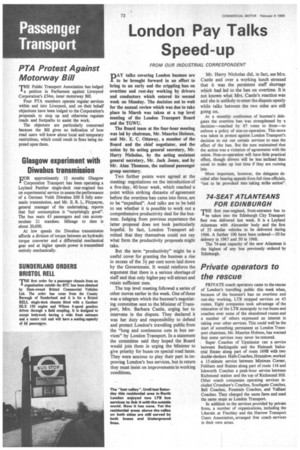London Pay Talks Speed-up
Page 74

If you've noticed an error in this article please click here to report it so we can fix it.
FROM OUR INDUSTRIAL CORRESPONDENT
pAY talks covering London busmen are to be brought forward in an effort to bring to an early end the crippling ban on overtime and rest-day working by drivers and conductors which entered its second week on Monday. The decision not to wait for the annual review which was due to take place in March was taken at a top level meeting of the London Transport Board and the TGWU.
The Board team at the four-hour meeting was led by chairman, Mr. Maurice Holmes, and Mr. E. C. Ottaway, a member of the Board and the chief negotiator, and the union by its acting general secretary, Mr. Harry Nicholas, by the acting assistant general secretary, Mr. Jack Jones, and by Mr. Man Thomson, the national passenger group secretary.
Two further points were agreed at the meeting: negotiations on the introduction of a five-day, 40-hour week, which reached a point within striking distante of agreement before the overtime ban came into force, are to be "expedited". And talks are to be held to see whether it is possible to work out a comprehensive productivity deal for the busmen. Judging from previous experience the latter proposal does not look particularly hopeful. In fact, London Transport admitted that they themselves could not say what form the productivity proposals might take.
But the term "productivity" might be a useful cover for granting the busmen a rise in excess of the 3+ per cent norm laid down by the Government. It would reinforce the argument that there is a serious shortage of staff and that only higher pay will attract and retain sufficient men.
The top level meeting followed a series of other moves earlier in the week. One of these was a telegram which the busmen's negotiating committee sent to the Minister of Transport, Mrs. Barbara Castle, urging her to intervene in the dispute. They declared it was her duty and responsibility to defend and protect London's travelling public from the "long and continuous cuts in bus services" by London Transport. In a statement the committee said they hoped the Board would join them in urging the Minister to give priority for buses on special road lanes. They were anxious to play their part in improving London's bus services, but in return they must insist on improvements in working conditions. Mr. Harry Nicholas did, in fact, see Mrs. Castle and over a working lunch stressed that it was the persistent staff shortage which had led to the ban on overtime. It is not known what Mrs. Castle's reaction was and she is unlikely to enter the dispute openly while talks between the two sides are still going on.
At a monthly conference of busmen's delegates the overtime ban was strengthened by a decision—reached by 67 votes to three—to enforce a policy of non-co-operation. This move was taken in protest against London Transport's decision to cut out certain services to ease the effect of the ban. But the men maintained that the action was a violation of agreements with the union. Non-co-operation will have little practical effect, though drivers will be less inclined than usual to make up lost time if they are running late.
More important, however, the delegates decided after hearing appeals from full-time officials, "not to be provoked into taking strike action".




































































































































































































